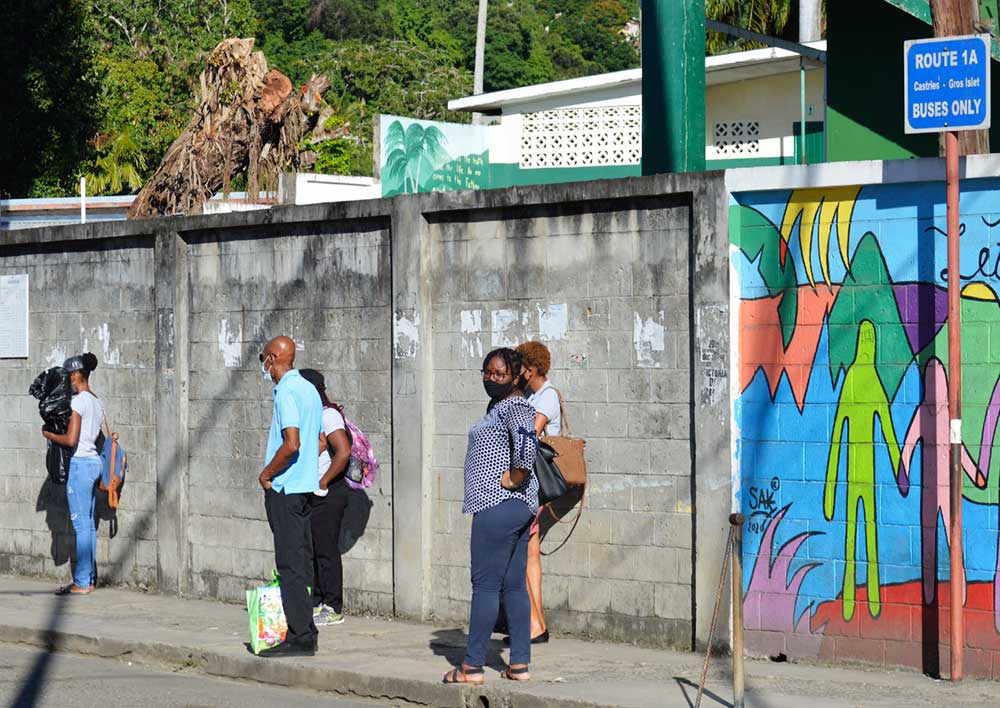PROTEST action by mini-bus drivers over COVID -19 regulations geared to limit the number of passengers on board a vehicle brought a temporary halt to regular transport procedures across the island.
Bus drivers island-wide are complaining that the 10-passenger regulation imposed by the authorities as a result of COVID-19 protocols is hampering their daily earnings and renders them incapable of managing basic domestic and commercial expenditures.

Effective Monday (December, 7) the strike action picked up steam as respective bus associations joined in solidarity with the Southern Bus Association to express their grievances.
The Southern Bus Association had initiated the protest action from last week and on Monday, Vieux Fort bus drivers made good on their ‘threat’ to go on strike over existing COVID-19 protocols for the public transport sector as other drivers joined in the fray.
“This has been just frustrating for a long time. For the past nine months we’ve been working under immense pressure; we cannot pay our bills, drivers cannot pay their loans and the banks are threatening them and you cannot put food on the table,” secretary of the Southern Bus Association, Vivian Jacob told the media.
He added: “This is the reason why we (are) saying to government that we cannot continue operating under these conditions.”
But what about the concessions given by government to ease the ‘economic’ pressure, did it help in anyway? Jacob states that this was payment due to them from years ago and this did not make much of a difference in their earnings.
He said: “The concession that government is offering bus owners or route band owners …they cannot go to the bank at this period, because it’s almost a useless concession at this time. We cannot continue with that kind of condition, as we cannot pay our bills.”
However, in the midst of this latest upheaval more drama has unfurled within the management ranks of the southern association, as earlier this week, members terminated the services of the president.
Sothern Bus Association president Phillip Jn. Baptiste, was rejected as someone who doesn’t support the cause as “we have a president who sabotaged us, he doesn’t want to support us …and we had to take a decision (on Sunday) at an extraordinary meeting to move him from there and we changed him.”
Jn. Baptiste is reported to have publicly spoken out against the strike, stating that it was politically motivated.
On Monday, Jacob disclosed that drivers from Gros Islet, Grand Riviere, Monchy and others in the Castries basin have since joined the strike; Dennery and Soufriere bus drivers later also joined the strike. He appealed to others who have not yet come on board to do so.
The scene at the Gros Islet bus stop in Castries Central on Monday was total chaos as commuters lined up to board the buses, some completely oblivious of a bus strike in progress.
Reports state that in the few instances when a bus pulled up to transport passengers people rushed to get aboard the bus, paying little attention to ‘social distancing’ protocols as stipulated under COVID-19 regulations.
Nonetheless, President of the Gros Islet Minibus Association Danny Edward put forward a case on behalf of the aggrieved drivers who claim they are not taking home enough pay to meet their basic demands and that of their families.
“We are standing in solidarity with our fellow bus drivers from Vieux Fort,” declared Edward.
He said bus drivers were restricted to ten passengers on the basis that they were not complying with protocols. The COVID-19 protocol also included a requirement for passengers to wear masks and sanitise their hands before entering.
Edward opined that since bus drivers are now in compliance, then “On that basis we should be getting our fifteen passengers.”
He added: “We are upholding the protocols, especially when it comes to Gros Islet – it costs us over $900 a week in upholding these protocols, so I think we should get some relief right now.”
Edward noted that bus drivers have been losing money from March, so taking strike action for a few days would not hurt them.
He said: “You need to fight for some things. We have waited – it’s now ten months into COVID – we have gotten no support, no relief, now it’s time for us to take some form of action so we can be heard.”
He said the bus drivers are willing to continue their strike for as long as it takes to get a ‘sit down’ with the authorities to address the concerns of the protesters.
Meanwhile, Godfrey Ferdinand, President of the National Council on Public Transportation (NCOPT) was due to meet with Transport Minister Guy Joseph, on Monday amid reports that the bus drivers’ strike was expanding.
However, Jacob feels the NCOPT does not show much interest in their cause. He said: “The National Council does not support what we are doing there, so how can they go and speak on behalf of us. We cannot tolerate the national council to go speak on our behalf when they are not supporting our cause…it’s because that they are not supporting our cause that we decided to go on the sick out.”
Consequently, Jacob feels that consultations with the government authorities should take on a multilateral approach and respective bus associations should have a representative at these talks.
Additionally, the Gros Islet Minibus Association has had a long standing grouse with the NCOPT – with whom they are not affiliated and so they too feel that the NCOPT cannot convene on their behalf.
Speaking on behalf of the drivers and in anticipation of favourable agreements arising from this latest impasse, Edwards said, “I’m hoping that the government will not go the route of a bus hike. What we’re asking for, we’re following the protocol …the motoring public is complying with wearing of mask (s) and we are saying that an increase in capacity in the persons that we carry is what we are looking for.”
The Dennery Minibus Drivers Association also added its support to the cause. President Francis Edmunds appealed to the authorities to heed the pleas from the transport sector and to take decisive action. “We know the government does not have money to pay us, but we have incurred losses way over $10,000 per driver and it’s no way the government will be able to compensate us for that .So what we’re saying is …just make some slight adjustments. A lot of commuters are with us on that …we want them to understand our plight. Just understand what we are going through, some persons cannot feed their families, some persons cannot buy tires and we cannot pay (loans) on our buses.”
He explained that drivers purchase buses in the range of approximately $150,000, with insurance costs at over $15,000 annually “and in some situations the drivers are the only bread winners at their homes …it’s just hell, we understand that it’s a global crisis bit we also want some adjustment to be made to at least offset some of our costs incurred.”
At a press briefing, on Monday, following emergency deliberations between NCOPT officials and Transport Minister Joseph, the minister said the determination of an increase in the number of passengers on commuter buses falls solely under the purview of the Chief Medical Officer (CMO).
“We are hoping that good sense will prevail in this matter and that the approach being taken by the council is one of continued dialogue …and the number of measures that can be taken to mitigate against the present situation,” Joseph said.
While the NCOPT says it remains committed to the transport sector, NCOPT Fist Vice President, Kentry Frederick had earlier disclosed that the council did not sanction the bus drivers’ strike that began Monday. The council had indicated that it has no written communique on what the issue may be.
He said the action being taken in the transportation sector affects a lot of people “you have to understand that you are affecting me …whether in the industrial sector or any other sector and the proper thing to do is to write so that the government is clear as to what you’re doing. But if you get up one evening …and by next morning you encourage persons not to work and to even use the form of threats for persons not to work , its’s not a good thing to do.”
The NCOPT says that once the issues are so articulated, the organisation and the Ministry of Transport will be available to discuss and bring a resolution to these matters.
Frederick noted: “We have to understand that this is a health pandemic and I am not into the health sector. What we are simply saying, whereas persons may want 15, 16, 18 passengers – this is not the issue. We are looking at safety for persons and not just money.”





